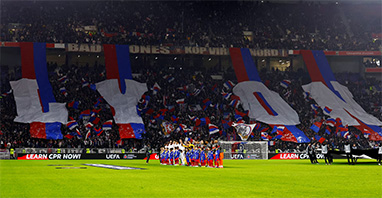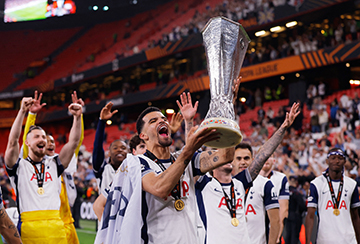EUROPA League
LIKE CURRENT COVID-19, HOW AN ICELANDIC VOLCANO CAUSED CHAOS AROUND THE WORLD OF SPORTS
Despite being a relatively small volcano, the ash cloud created by Eyjafjallajokull’s eruption caused the highest level of disruption to air travel since World War II.
From April 14, the volcano produced an estimated 250 million cubic metres of ash and small debris, which rose to a height of around 9km.
What turned a local problem into an international crisis, however, was that the volcano was situated directly under the jet stream, which was unusually stable at the time and blowing steadily south-easterly, pushing the ash cloud straight towards mainland Europe.
The initial human impact was felt in Iceland, with hundreds living near to the eruption site evacuated and farmland and livestock severely affected by ash.
But the main effects were felt in the aviation industry. As well as concerns over poor visibility, the glass-rich nature of the ash cloud, caused by a reaction between melting ice and lava, was potentially particularly damaging for aircraft engines, and there were widespread fears of crashes.
Huge amounts of European airspace was consequently shut down, with countries ranging from Belarus to Turkey, Finland and Ukraine all affected.
An estimated 10 million passengers were stranded, not only in Europe but around the world.
After an initial shutdown across northern Europe in April, there were further shutdowns in May affecting the UK, Ireland, Spain, Portugal, Italy, Austria and Germany.
The cost to the airline industry caused by 95,000 grounded flights was estimated to be £130million per day, with a total loss of around £1.1billion.
TUI reported losses of £5-6m per day during the airspace closure, while 13 other travel firms went bust.
Other areas of the economy hit by disruption to supply chains included the pharmaceutical and car-making industries. BMW, Nissan and Honda all suspended production on some models, while Asian electronics producers such as Samsung were unable to export large amounts of goods.
The Kenyan flower industry also lost millions per day, with a reported 400 tonnes of flowers destroyed as they were unable to be airshipped into the UK.
The ban on flights in the UK disrupted the general election campaign trail. Former Prime Minister Tony Blair was among those affected, as he was stranded in Israel during his campaign tour.
Meanwhile, Prince Charles, Barack Obama, Angela Merkel, Nicolas Sarkozy and others were forced to miss the funeral of Polish president Lech Kaczynski, who had died in a plane crash.
The comedian and actor John Cleese was reported to have spent roughly £3,300 on a taxi journey from Oslo to Brussels after a flight was cancelled. His 900-mile journey lasted around 15 hours, and passed through Norway, Sweden, Denmark, Germany, the Netherlands and Belgium.
Sir David Attenborough and his crew, who had reached the North Pole to film the upcoming BBC nature series The Frozen Planet, were temporarily stranded in the Norwegian Arctic territory of Svalbard.
–Daily Mail
EUROPA League
UEFA await Lyon relegation appeal before Palace Europa League decision

UEFA has decided to postpone its assessment of the multi-club ownership case involving Olympique Lyonnais and Crystal Palace until the French club’s relegation has been confirmed, European football’s governing body said on Monday.
The multi-club ownership regulations do not allow clubs under the same ownership compete in the same European competition, and American businessman John Textor holds a stake in both Palace and Lyon.
Palace qualified for the Europa League by winning the FA Cup last season while Lyon reached the competition by finishing sixth in Ligue 1 but have since been relegated to Ligue 2 by French football’s financial watchdog (DNCG).
Lyon are appealing the decision, which came following an audit of the club’s finances, and UEFA’s Club Financial Control Body will now await the outcome of the appeal before making its decision.
UEFA and Lyon reached a settlement agreement over the club’s breach of the financial sustainability requirements, and as part of the settlement, Lyon agreed to their exclusion from European competition should the DNCG confirm their relegation.
League of Ireland club Drogheda United lost an appeal to the Court of Arbitration for Sport earlier this month over their exclusion from the Conference League, after falling foul of the multi-club ownership rules.
-Reuters
Join the Sports Village Square channel on WhatsApp: https://whatsapp.com/channel/0029Vaz7mEIGk1FxU8YIXb0H
EUROPA League
Tottenham sack Postecoglou, two weeks after Europa League glory

Tottenham Hotspur have sacked manager Ange Postecoglou, the club said on Friday, little more than two weeks after the Australian guided the London club to a first major trophy in 17 years with victory in the Europa League final.
While Postecoglou’s fate has split opinion amongst the fans, the 59-year-old ultimately paid the price for an horrendous Premier League season which saw Tottenham finish 17th.
“The Board has unanimously concluded that it is in the best interests of the Club for a change to take place,” Tottenham said in a statement.
“Following a positive start in the 2023/24 Premier League (PL) season, we recorded 78 points from the last 66 PL games. This culminated in our worst-ever PL finish last season.”
Postecoglou leaves two years to the day after his appointment and 16 days after his side beat Manchester United 1-0 in Bilbao for the club’s first silverware since 2008, a win that also put them in next season’s Champions League.
The former Celtic manager has had to face questions over his future for several months, yet delivered on his claim early last season that he always wins a trophy in his second season in a job
He also took Tottenham to the League Cup semi-final but their league campaign was their worst since 1976-77, the last time the club suffered relegation from the top flight.
Several of the club’s first team have voiced their support for Postecoglou since beating United, but chairman Daniel Levy is now searching for his fifth full-time manager in six years since Mauricio Pochettino was sacked in 2019.
“At times there were extenuating circumstances — injuries and then a decision to prioritise our European campaign,” the club said. “Whilst winning the Europa League this season ranks as one of the Club’s greatest moments, we cannot base our decision on emotions aligned to this triumph.”
Several managers have been linked to the Tottenham job, including Brentford’s Thomas Frank and Crystal Palace’s Oliver Glasner.
GOOD START
Postecoglou will walk away with his pride intact and a handsome bonus, but his recent comment to fans at the Europa League victory parade that the third season of a TV series is always better than the second now looks hollow.
It all started so well for Postecoglou. He began the 2023-24 campaign by guiding Tottenham to their best start to a top-flight season since the 1961 title-winning team.
That form soon dipped though and despite finishing fifth in his first campaign the momentum had long since gone.
This season Tottenham earned only 38 points and lost 22 top-flight matches. They managed five points from their last 12 league games and the only win they earned during that run was against a Southampton side who narrowly avoided becoming statistically the worst team ever in the Premier League.
Postecoglou has pointed to a long injury list which denied him the likes of Cristian Romero, Micky van de Ven, Dejan Kulusevski, Destiny Udogie, Dominic Solanke, James Maddison and Son Heung-min for significant periods.
But while it has clearly been one of long-serving chairman Levy’s toughest calls, he has concluded that Postecoglou is not the man to lead the club forward.
“We have made what we believe is the right decision to give us the best chance of success going forward, not the easy decision,” the club statement said.
“We have a talented, young squad and Ange has given us a great platform to build upon. We should like to express our gratitude to him. We wish him well for the future — he will always be welcome back at our home.”
Many fans reacted to the news of Postecoglou’s sacking with surprise, but England manager Thomas Tuchel said that sometimes even winning a trophy is not enough.
“I feel for every manager and I have huge sympathy for every manager in these moments because I was in the same spot,” the German, who was sacked by Chelsea despite taking them to the Champions League title, said on Friday.
“If the trust is not there anymore then sometimes it’s not enough to win a trophy.”
-Reuters
Join the Sports Village Square channel on WhatsApp: https://whatsapp.com/channel/0029Vaz7mEIGk1FxU8YIXb0H
EUROPA League
UEFA apologises after running out of medals during Europa League final ceremony

UEFA apologised for running out of winners’ medals during the Europa League final trophy ceremony on Wednesday after more Tottenham Hotspur players lined up to receive their prizes.
Spurs captain Son Heung-min and two other players, the last to line up for individual medals, were left empty-handed after their team beat Manchester United 1-0 to win the club’s fourth European title on Wednesday.
Son lifted the trophy without a medal around his neck.
“To our great displeasure, we did not have enough medals available on stage during the trophy ceremony presentation due to an unexpected discrepancy in the player count …” British media quoted European soccer’s governing body as saying on Thursday.
“More team members – including injured players – participated in the ceremony than initially anticipated.
“The missing medals were promptly delivered to the winning team in the dressing room, along with our sincerest apologies for the oversight.”
-Reuters
Join the Sports Village Square channel on WhatsApp: https://whatsapp.com/channel/0029Vaz7mEIGk1FxU8YIXb0H
-

 World Cup2 days ago
World Cup2 days agoFIFA May Shift 2026 World Cup Matches from U.S. to Canada Over Visa and Human Rights Concerns
-

 OBITUARY2 days ago
OBITUARY2 days agoBREAKING! Former Super Eagles Coach and Ex-International Monday Sinclair Passes On
-

 OBITUARY5 days ago
OBITUARY5 days agoBREAKING: Former Nigerian President Muhammadu Buhari Dies at 81
-

 WAFCON1 week ago
WAFCON1 week agoTensions Flare as Algeria Politicizes 2025 Women’s AFCON in Morocco
-

 La Liga1 week ago
La Liga1 week agoFormer Real Madrid manager and Brazil Coach, Carlo Ancelotti sentenced to prison
-

 Nigerian Football4 days ago
Nigerian Football4 days agoLegacy Renewed: Taiwo Lekan-Salami Charts Bold Path for Shooting Stars Revival
-

 Nigerian Football6 days ago
Nigerian Football6 days agoEx-NFF President Maigari Pays Solidarity Visit to Recuperating Ibrahim Galadima in Kano
-

 MEDIA1 week ago
MEDIA1 week agoMumini Alao to Launch Autobiography with High-Profile Guests Set to Attend




